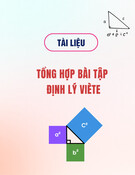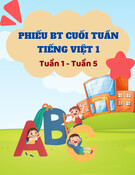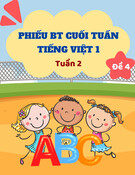
PRACTICE TEST 10
I/ Phonetics:
A. Pick out the word whose underlined part is pronounced differently from that of the other words.
1. A. this B. that C. think D. there
2. A. achieve B. children C. change D. chemistry
3. A. money B. modern C. mother D. month
4. A. precise B. promise C. realize D. revise
5. A. trade B. spade C. grateful D. damage
B. Pick out the word that has the stress pattern different from that of the other words.
6. A. dependent B. currency C. business D. recognize
7. A. imagine B. convenient C. industry D. security
8. A. success B. amount C. system D. receive
9. A. community B. protection C. develop D. company
10. A. national B. natural C. agency D. collection
II/ Vocabulary and Structure
A. Error recognition : Choose the underlined part ( A,B,C or D ) that is incorrect.
11. It is the writing English that causes difficulties to foreigners.
A B C D
12. A shape with four equal sides and one right angle is called a rectangle.
A B C D
13. Janet is finally used to cook on electric stove.
A B C D
14. Rock music is popular not in the United States but also abroad.
A B C D
15. Since it lives in the desert, the collared lizard depends from insects for water as well as for food.
A B C D
16. School children in the same grade are usually the same old as their classmates.
A B C D
17. Some methods to prevent soil erosion are plowing parallel with the slopes of hills, to plant trees and rotating
A B C D
crops.
18. Fertilizers are used primarily to enrich soil and increasing yield.
A B C D
19. Although the increase in air fares, most people still to travel by plane
A B C D
20. No other quality is more important for a scientist to acquire as to observe carefully.
A B C D
B. Choose the one (A,B,C or D) that best completes each sentences.
21. Recent achievements in science and technology have given us instant and __________ communication.
A. world-wide B. world-over C. worldly D. world-large
22. Coins last approximately twenty times __________ paper notes.
A. longer B. longer than C. as long D. more longer
23. I think your car needs __________ .
A. fixing B. to fix C. to be fixed D. both A and C are correct
24. Flower oils are __________ of the ingredients used in making perfume.
A. among expensive B. among the most expensive
C. being most expensive D. expensive
25. Fast-food restaurants have become popular because many working people want __________ .
A. eating quickly and cheaply B. eat quickly and cheaply
C. to eat quickly and cheaply D. the eat quickly and cheaply
26. When we arrived at the restaurant, the others __________ .
A. left B. have left C. had left D. are leaving
27. Staying in a hotel costs __________ renting a room in a dormitory for a week.
A. twice than B. twice as many as C. as much as twice D. twice as much as
28. To answer accurately is more important than __________ .
A. a quick finish B. finishing quickly C. you finish quickly D. to finish quickly
29. Travellers __________ their reservations well in advance if they want to fly during the Christmas holidays.
A. had better get B. had to get better C. had better to get D. had better got
30. Oh no! It’s already 5pm, but I haven’t __________ the letters.
A. finished typing B. been finished typing C. finished to type D. been finishing typing
31. Nine of every ten people in the world __________ in the country in which they were born.
A. live B. they are living C. living D. lives
32. I remember __________ the letter a few days ago but I can’t remember exactly when.
A. to receive B. to have received C. receiving D. I receive

33. __________ patient and you will succeed.
A. To be B. Be C. Being D. In order to
34. The bank is on __________ side of the street.
A. another B. other C. the other D. the next
35. It is a new clock but it doesn’t always keep _________ time.
A. serious B. accurate C. true D. certain
II / Readings
A. Circle the best options to complete the following passage.
People work are deprived (36) _________ sleep lose energy and become quick-tempered. After two days (37)
_________ sleep, a person finds that lengthy concentration becomes difficult. He can force (38) _________ to perform
tasks well for short periods, but he is easily (39) _________. He (40) _________ many mistakes, especially at routine
tasks, and his attention slips (41)_________ times. Every “sleepless” person experiences periods in which he (42)
_________ off for a few seconds or more. He (43) _________ completely asleep unless he is kept active continuously.
Persons who go without sleep for more than three days have great difficulty thinking, seeing, and hearing
clearly. They have periods of hallucinations (44) _________ they see things that do not really exist. They also confuse
day dreams with real life and (45) _________ track of their thoughts in the middle of a sentence.
36. A. up B. of C. by D. with
37. A. with B. no C. have no D. without
38. A. him B. himself C. it D. them
39. A. distracted B. distracting C. distract D. be distracted
40. A. does B. creates C. causes D. makes
41. A. by B. at C. with D. before
42. A. dozes B. sleeps C. nap D. drowses
43. A. becomes B. gets C. falls D. is
44. A. which B. that C. during which D. in that
45. A. miss B. keep C. catch D. lose
B. Read the passage and then answer the questions below.
A greeting is a way of being friendly to someone. It is a way of being polite. It is also a way of starting a
conversation. In many languages a question is used as a greeting “Where are you going?” “How’s everything with
you?” But questions like these are not real questions. They do not require a full answer or even a true one. In English,
the commonest greeting is a question about a person’s health. “How are you?” But we do not expect the person to tell
us about their health when they reply. We do not expect them to talk about their headache or their backache if they have
one. People reply to these questions with a fixed expression such as “I’m fine, thanks” or “I’m very well, thanks”. In the
same way, in countries where people greet each other with “Where are you going?”, a simple reply such as “Just
walking around” is sufficient. It is not necessary to describe where you are actually going. In most languages, a greeting
is usually followed by “small talk”. Greetings and small talks are an important part of conversation in any language.
The way people greet each other and the things they talk about, however, may be different from one language to
another. This shows that there is much more to learn when we learn a language than just the vocabulary and the
grammar of the language. We also have to learn the social behaviour of the people who speak it.
46. A greeting is __________.
A. a way of being friendly to someone, of being polite and of starting a conversation
B. the things they talk about
C. a question used in many languages
D. the way people greet each other
47. In many languages, __________.
A. questions used as greetings are equal questions
B. questions used as greetings require the real answer
C. a questions is used as a greeting
D. “Where are you?” or “How’s everything with you?” isn’t considered as a greeting.
48. In English, __________.
A. “How are you?” is a question that requires the real answer
B. a full answers to the questions about health is required
C. the commonest greeting is the question “How are you?”
D. “I’m fine, thanks” or “I’m very well, thanks” is not a common reply to the questions.
49. Which sentence is not correct?
A. Greetings and talks in most languages are a like.
B. In most languages, a greeting is usually followed by small talk.
C. There is much more to learn when we learn a language than just its vocabulary and the grammar.
D. Greetings and small talks are an important part of conversation in any language.
50. The main idea of the passage is __________.
A. daily conversations B. greetings – an important cultural feature
C. good greetings D. small talks





![Bài tập so sánh hơn và so sánh nhất của tính từ [kèm đáp án/mới nhất]](https://cdn.tailieu.vn/images/document/thumbnail/2025/20250808/nhatlinhluong27@gmail.com/135x160/77671754900604.jpg)
![Tài liệu tham khảo Tiếng Anh lớp 8 [mới nhất/hay nhất/chuẩn nhất]](https://cdn.tailieu.vn/images/document/thumbnail/2025/20250806/anhvan.knndl.htc@gmail.com/135x160/54311754535084.jpg)




![Tài liệu Lý thuyết và Bài tập Tiếng Anh lớp 6 [Mới nhất]](https://cdn.tailieu.vn/images/document/thumbnail/2025/20250802/hoihoangdang@gmail.com/135x160/18041754292798.jpg)





